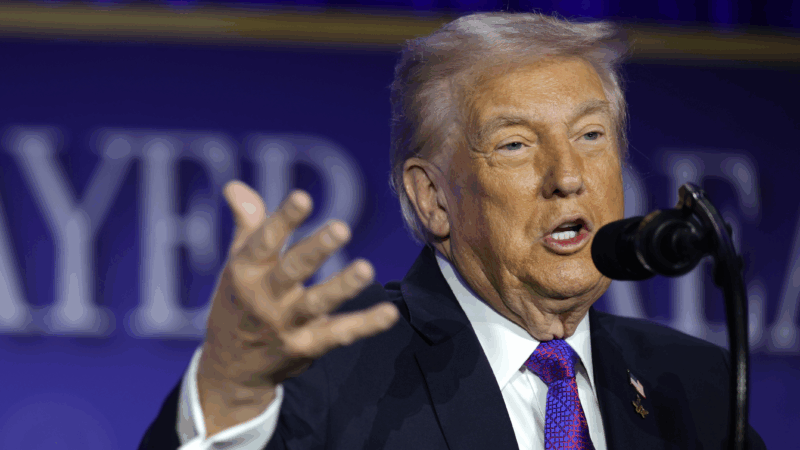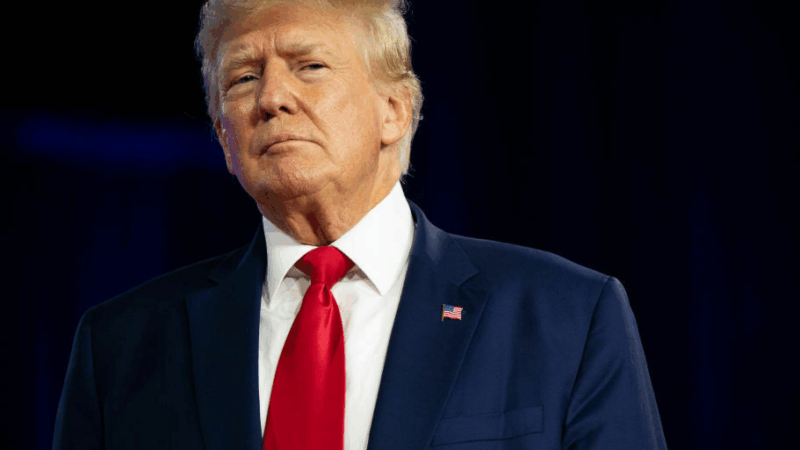The GOP megabill is moving to the Senate, where big changes could be in store
The fate of legislation to enact President Trump’s domestic policy agenda moves to the GOP-controlled Senate this week, where a handful of Republican spending hawks are criticizing the price tag of the president’s mega-bill, which would grow the national debt by trillions of dollars, and calling for changes.
In May, the House narrowly passed the “One Big Beautiful Bill Act” — which would cut taxes and increase border and military spending, while scaling back spending on Medicaid, the joint federal/state health care program for low-income, elderly and disabled Americans.
The sweeping plan is moving through Congress under a budget process known as reconciliation. It allows Senate Republicans to pass legislation through the 100-member chamber with a simple majority, rather than requiring the body’s de facto sixty-vote threshold.
In practice, that allows Republicans to move ahead without any support from Democratic lawmakers. But with Republicans clinging to a narrow majority in the Senate, Majority Leader John Thune, R-S.D., can only afford to lose three members of his party — and several are already signaling problems with the current version of the bill.
On Sunday, Sen. Ron Johnson, R-Wis., told Fox News the bill was “completely unsustainable” and that he plans to hold a hearing on it before a full Senate vote. And on CBS News, Sen. Rand Paul, R-Ky., said he thinks there is enough Republican opposition to change the bill the House passed.
Worries about the deficit
At the heart of the GOP bill is an extension of President Trump’s 2017 tax cuts. The plan also looks to make good on several of Trump’s promises from the campaign — including a temporary pause on taxes on tips and overtime for the remainder of President Trump’s term.
According to an analysis of the bill’s tax provisions by the nonpartisan Congressional Budget Office, the package’s tax changes would raise the deficit — the gap between how much the government earns in tax revenue and how much it spends — by an estimated $3.8 trillion over the next 10 years.
The White House has criticized this CBO estimate, as have several Republican lawmakers.
Since the House passed the bill, tech-billionaire Elon Musk has spoken out about its projected impact to the deficit, as has JP Morgan Chase CEO Jamie Dimon. Speaking at an economic forum on Friday, Dimon warned continued government spending will create a “crisis” in the bond market by undermining public confidence in the ability of the U.S. government to pay back its debts.
Sen. Johnson agreed.
“It’s completely unsustainable,” Johnson told Fox News on Sunday. “I agree with Jamie Dimon here.”
Johnson said he wants to return spending to pre-pandemic levels, and break up the House bill into two separate Senate bills. When asked if he is willing to “blow up” Trump’s agenda, Johnson said he supports the president, but doesn’t approve of the House bill.
“My loyalty is to the American people, to my kids and grandkids,” Johnson said. “We cannot continue to mortgage their future.”
Sen. Paul said he and Johnson aren’t the only GOP senators with concerns about the House bill’s impact on the deficit.
“I think there are four of us at this point, and I would be very surprised if the bill at least is not modified in a good direction,” Paul told CBS News.
On Saturday, Trump warned on social media that if Sen. Paul votes against the bill, “the GREAT people of Kentucky will never forgive him!”
Paul has been a vocal critic of a provision in the bill to raise the nation’s debt limit by $4 trillion. Treasury Secretary Scott Bessent has said the nation could run out of money to pay its bills by August and trigger a potential financial crisis if Congress doesn’t lift the limit before then.
Speaking on CBS’ Face the Nation on Sunday, Bessent sought to ease GOP concerns about the deficit.
“The deficit this year is going to be lower than the deficit last year, and in two years it will be lower again. We are going to bring the deficit down slowly, he said.”
Cuts to Medicaid
The House bill seeks to cut hundreds of billion in spending on Medicaid by introducing new work requirement, shortening the enrollment period and eliminating what Republicans say is “waste, fraud and abuse” in the system.
A CBO analysis of a previous proposal to put work requirements on Medicaid projected that — while federal costs would decrease — the number of people working would remain unchanged. State costs, due to the price of implementing and administering the new requirements, would increase substantially.
Some Republicans have concerns about the Medicaid changes that go beyond their cost. Debates over Medicaid almost killed the bill in the House, and the issue is equally contentious in the Senate.
In May, Sen. Josh Hawley, R-Mo., wrote in The New York Times that significant cuts to Medicaid “is both morally wrong and politically suicidal.”
“Republicans need to open their eyes: Our voters support social insurance programs,” Hawley wrote in an opinion piece. “More than that, our voters depend on those programs.”
Hawley, though, has since argued work requirements for Medicaid don’t count as cuts.
On Friday, Sen. Joni Ernst, R-Iowa, defended the House bill and its changes to Medicaid during a fiery town hall in Iowa.
“When you’re arguing about illegals that are receiving Medicaid benefits, 1.4 million (people) … they are not eligible so they will be coming off,” Ernst said.
Then someone in the crowd yelled: “People are going to die.”
“Well, we all are going to die,” Ernst responded, eliciting jeers from the audience.
The exchange went viral and highlighted the political stakes over Medicaid. Democrats have since criticized Ernst’s response.
Some policies in the bill are at risk of falling out
The GOP bill could also face changes in the Senate due to a quirk in the reconciliation process known as the Byrd Rule — named for the late West Virginia Democratic Sen. Robert Byrd. The rule is meant to rid legislation of “extraneous matter” that has limited to no impact on the deficit. It allows senators to offer amendments that strike certain aspects of a reconciliation bill.
While it remains unclear what portions of the House bill will be hit by the Byrd Rule, certain non-budgetary measures could be at risk. These include House bill measures on AI regulations, judicial power, gun regulation and Planned Parenthood, among others.
If the Senate alters the legislation and passes a changed version of the bill, it will have to go back to the House for final approval.
Congressional Republicans are hoping to have the bill to President Trump’s desk by July 4.
Mariah Carey, coffee makers and other highlights from the Olympic opening ceremony
NPR reporters at the Milan opening ceremony layered up and took notes.
Trump’s harsh immigration tactics are taking a political hit
President Trump's popularity on one of his political strengths is in jeopardy.
A drop in CDC health alerts leaves doctors ‘flying blind’
Doctors and public health officials are concerned about the drop in health alerts from the Centers for Disease Control and Prevention since President Trump returned for a second term.
Photos: Highlights from the Winter Olympics opening ceremony
Athletes from around the world attended the 2026 Winter Olympics opening ceremony in Milan.
Alabama sets execution for man in auto parts store customer’s death
Gov. Kay Ivey on Thursday set a March 12 execution using nitrogen gas for Charles “Sonny” Burton. Burton was convicted as an accomplice in the shooting death of Doug Battle, a customer who was killed during an 1991 robbery of an auto parts store in Talladega.
Trump posts racist meme of the Obamas — then deletes it
Trump's racist post came at the end of a minute-long video promoting conspiracy theories about the 2020 election.







